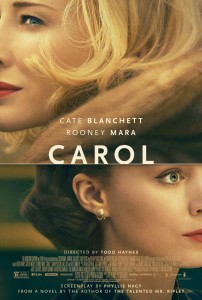Carol, directed by Todd Haynes, is a sumptuous reverie. Adapted by Phyllis Nagy from the novel The Price of Salt by Patricia Highsmith, the film follows the blossoming romantic relationship between two women in the late 1940s. Executed with polished flair, the film is consistently solid on all fronts – in its evocative cinematography and costume design, its layered screenplay, its assured direction. But what makes it most memorable are the brilliant understated performances of its two leads, who provide a portrait of simmering, burgeoning desire that is quietly captivating to behold.
Therese (Rooney Mara) works at a children’s toy store in New York City, and although she has a boyfriend she remains distant and indifferent to his declarations of love. Carol (Cate Blanchett) wants to separate from her husband Harge (Kyle Chandler), but this is complicated by the resultant custody battle over their young daughter.
Their lives intersect with a glance. From behind her counter at the toy store Therese sees Carol across the room, looking at a toy train set. Carol briefly returns her gaze. After buying the train set as a Christmas present for her daughter, they embark on a friendship of sorts, through lunches and visits to Carol’s lavish country house. Their ensuing relationship unfolds with countless furtive glances, imbued with curiosity and desire. However, after they embark on a spontaneous road trip together Harge’s suspicions over the nature of their relationship become increasingly apparent, along with the realisation that they share romantic feelings for each other.
Stylistically and thematically, Carol shares many similarities with Hayne’s film Far From Heaven, which was set during the same time period and also focuses on social taboos of the period. And whilst Carol’s visual splendour is less overtly nostalgic – its colour palette is more muted – in both films there is the sense that beneath the alluring surface appearances lie rich inner worlds of loneliness and longing, longing not only to be with others but to be themselves.
Under Haynes’ skilled direction these inner worlds are negotiated and revealed through an immersive, measured build, and the performances are exceptional in modulating this unfolding.
Beyond the two leads, Chandler is impressive as a husband desperately trying to save his marriage, palpably conflicted between his genuine love for Carol whilst also unable to accommodate or reconcile that she may no longer have feelings for him, or perhaps for any man for that matter. But in the end Rooney and Blanchett anchor the film. Mara’s soft, expressive features and inquisitive eyes complement the reserved yet youthful naiveté she conjures, making her performance heartbreakingly convincing. And Blanchett is simply superb as a woman living at a time when coming into her own as an individual may not have been compatible with being a mother. She invokes an effortless poise and elegance, but also hints at her character’s implicit performativity in sustaining this aura. Carol is independent, self-aware but constrained, and tragically she understands that sacrifices will need to be made. Together, they create a compelling portrait of youth and experience, of repression and desire, and of two women hindered but not paralysed by the social taboos of their time.
Carol in cinemas from 14th January through Transmission Films.





